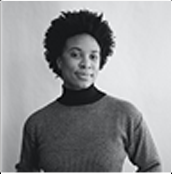
“I'm Kira Joy Williams. I'm a photographer, a storyteller, and an archivist. I'm a portrait photographer. For my main project, I photograph Black people - people of the African diaspora. And I want to record them in a full light - everything that a portrait has to offer. So that visual data (essentially because every image is data) can be recorded for an archive that I'm building. I'm also interviewing them, doing oral histories, and helping people just tell their story in this full way with photographs and stories. I'm also interested in what sort of artifact or family heirlooms they want to bring into this project. So in building this archive, I'm talking to people, starting where I live now in the neighborhood of Bed Stuy, Brooklyn. And talking to people of the African diaspora about what home means to them. I'm concentrating on home because place and belonging and safety are something that Black people in the US have a very tenuous relationship with, like being displaced as a result of the transatlantic slave trade. All of this is born out of me wanting to know more about my heritage as a Black woman.”
Kira on telling stories through art and continuous creation:
“Unfinishedness is also a tenet of oral history. As long as a person is alive, they can continue to tell story after story after story. The history is never finished. So that acceptance about the fact that it's always going to be unfinished is something that I think is really beautiful. I think art is always unfinished. Actually activism is always unfinished, constant revolution and like working towards a utopia is something that is the goal - constant revolutions. We should never be stagnant. So with that foundation, because I'm asking about home, what people find home in, what makes home for people, what do they define it as - is it place? is it belonging? Is it your apartment? People often talk about their family. They talk about just growing up here. Their experiences and histories. They talk about sort of unconditional love and loss, and finding belonging and place in a place where people have built unconditional love and community. In a place that is based on loss. We came here, lost everything, lost families, homes, (speaking about the slave trade), and built this country. And then we built places for ourselves as Black Americans when we were being denied everything. There's always this underlying theme of displacement, being out of place, or loss, and trying to reclaim the space.”
